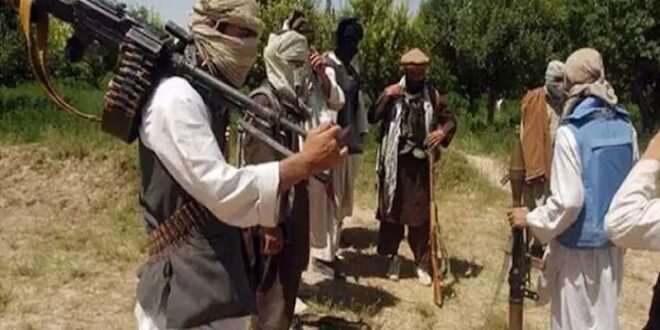Pakistan’s security landscape has become increasingly volatile, as evidenced by the recent spate of attacks on military bases and law enforcement officers. A newly emerged group, Tehreek-e-Jihad Pakistan (TJP), has claimed responsibility for a brazen assault on a military base in Northern Balochistan, resulting in casualties among soldiers.
This attack is a grim reminder of the longstanding ethnic separatist uprising in Balochistan, a mineral-rich province that shares borders with Afghanistan and Iran. Adding to the complexities are the Tehreek-e-Taliban Pakistan (TTP) and the Islamic State (ISIS) armed groups, which have exacerbated security challenges. Furthermore, the evolving situation in neighboring Afghanistan, with the rise of the Taliban, has played a significant role in contributing to Pakistan’s escalating violence. This article delves deeper into the multifaceted security threats plaguing Pakistan and explores potential strategies to restore peace and stability in the region.
The Unraveling Security Situation in Balochistan
Balochistan, a province rich in natural resources, has been grappling with a decades-old ethnic separatist insurgency. The region’s strategic importance due to its vast copper, zinc, and natural gas reserves has made it an attractive target for various armed groups vying for influence.
These groups perceive violence as a means to disrupt China’s ambitious investment plans in the region, aiming to connect Xinjiang province to the Arabian Sea through extensive infrastructure projects. As a result, cities in Balochistan have become frequent targets of violent attacks, particularly those involving law enforcement officers and workers involved in China’s multi-billion-dollar investment endeavors.
The Tehreek-e-Taliban Pakistan (TTP) and ISIS: Escalating Violence
The government’s claims of quelling the armed uprising have been challenged by the emergence of the Tehreek-e-Taliban Pakistan (TTP) and ISIS as significant threats in Balochistan. The situation worsened after the breakdown of a ceasefire agreement with the government in late 2022.
One of the most devastating incidents was the bombing of a mosque in Peshawar, which claimed over 100 lives in January. Islamabad accuses the rebel groups of shifting their operations to Afghanistan, a claim that has been refuted by Kabul. This cross-border element has complicated efforts to contain and eliminate these extremist groups.
The Afghanistan Factor: Taliban and ISIS-Khorasan
The security scenario in Pakistan is also intricately linked to the developments in neighboring Afghanistan. Since the Taliban’s takeover in August 2021, Afghanistan has transformed into a volatile hub for various extremist groups. The Tehreek-e-Taliban Pakistan (TTP) and other militants have sought refuge across the border, allowing them to launch cross-border attacks within Pakistan’s territory.
The return of the Taliban to power has emboldened these groups, presenting a formidable challenge to regional stability. Of particular concern is the Islamic State’s branch in Afghanistan and Pakistan, known as ISIS-Khorasan. This group has become increasingly active and is focused on conducting external operations, posing a threat to global security. Their centralized propaganda apparatus has intensified media output, targeting not only Pakistan but also the United States, China, and Russia.
The Complex Nexus of Internal and External Factors
The escalating insecurity in Pakistan is a confluence of various internal and external factors. The longstanding ethnic separatist uprising in Balochistan, coupled with the presence of the Tehreek-e-Taliban Pakistan (TTP) and ISIS in the region, has significantly impacted the security landscape. Moreover, the involvement of the Taliban in Afghanistan and its nexus with ISIS-Khorasan’s activities has further complicated the situation.
Several underlying factors contribute to the perpetuation of violence and instability in the region. Socioeconomic disparities, political marginalization, and weak governance structures have contributed to the disillusionment of certain ethnic and sectarian groups, leading them to take up arms against the state. Additionally, the presence of ungoverned spaces, porous borders, and a flourishing illicit economy have enabled extremist groups to find safe havens and resources to sustain their operations.
Challenges in Countering the Security Threats
Addressing the security challenges in Pakistan requires a multi-pronged approach. The government must focus on implementing comprehensive counterterrorism and counterinsurgency strategies that emphasize intelligence gathering, community engagement, and targeted military operations. Moreover, addressing the root causes of violence, such as economic marginalization and political alienation, is critical to preventing the radicalization of vulnerable populations.
Furthermore, regional cooperation is of utmost importance in combating cross-border terrorism. Pakistan and Afghanistan must work together to strengthen border management and intelligence sharing to prevent extremist groups from exploiting porous borders to launch attacks. Confidence-building measures and diplomatic engagements between the two countries are vital to fostering mutual trust and cooperation in addressing shared security challenges.
Conclusion
Pakistan’s security landscape remains highly complex, with a multitude of internal and external factors contributing to the escalating violence and instability. The longstanding ethnic separatist uprising in Balochistan, the presence of Tehreek-e-Taliban Pakistan (TTP) and ISIS, and the evolving situation in Afghanistan all play significant roles in shaping the security challenges faced by the country. To restore peace and stability, a multifaceted approach is required. This includes addressing the root causes of violence, implementing robust counterterrorism measures, and strengthening regional cooperation to counter cross-border terrorism.
Moreover, international support and collaboration are crucial in combating extremist groups that pose a global security threat. Achieving lasting peace and stability in Pakistan will demand collective efforts from all stakeholders, including the government, security forces, civil society, and regional partners. Only through a united and coordinated approach can Pakistan overcome its security quagmire and pave the way for a safer and prosperous future for its citizens.
 Eurasia Press & News
Eurasia Press & News



